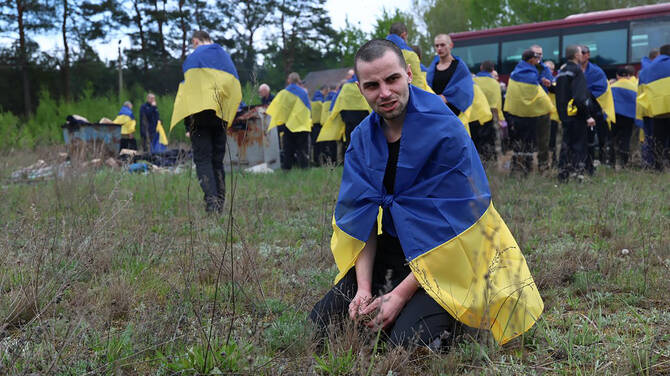Israel has cut off the entry of all food and other goods into Gaza in an echo of the siege it imposed in the earliest days of its war with Hamas. The United Nations and other humanitarian aid providers are sharply criticizing the decision and calling it a violation of international law.
“A tool of extortion,” Saudi Arabia’s foreign ministry said. “A reckless act of collective punishment,” Oxfam said. Key mediator Egypt accused Israel of using “starvation as a weapon.”
Hunger has been an issue throughout the war for Gaza’s over 2 million people, and some aid experts had warned of possible famine. Now there is concern about losing the progress that experts reported under the past six weeks of a ceasefire.
Israel is trying to pressure the Hamas militant group to agree to what Prime Minister Benjamin Netanyahu’s government describes as a US proposal to extend the ceasefire’s first phase instead of beginning negotiations on the far more difficult second phase. In phase two,
Hamas would release the remaining living hostages in return for Israel’s withdrawal from Gaza and a lasting ceasefire.
Here’s a look at what Israel’s decision means and the reactions.
No word from the US
The ceasefire’s first phase ended early Sunday. Minutes later, Israel said it supported a new proposal to extend that phase through the Jewish holiday of Passover in mid-April. It called the proposal a US one from Mideast envoy Steve Witkoff. Israel also warned it could resume the war after the first phase if it believes negotiations are ineffective.
Negotiations on the second phase were meant to start a month ago, increasing the uncertainty around the fragile truce. Hamas has insisted that those talks begin.
Later Sunday, Israel announced the immediate cutoff of aid to Gaza.
The Trump administration has not issued a statement about Israel’s announcement or its decision to cut off aid. It’s also not clear when Witkoff will visit the Middle East again. He had been expected to visit last week.
The US under the Biden administration pressed Israel to allow more aid into Gaza, threatening to limit weapons support. Aid organizations repeatedly criticized Israeli restrictions on items entering the small coastal territory, while hundreds of trucks with aid at times waited to enter.
Israel says it has allowed in enough aid. It has blamed shortages on what it called the UN’s inability to distribute it, and accused Hamas militants of siphoning off aid.
For months before the ceasefire, some Palestinians reported limiting meals, searching through garbage and foraging for edible weeds as food supplies ran low.
600 trucks of aid a day
The ceasefire’s first phase took effect on Jan. 19 and allowed a surge of aid into Gaza. An average of 600 trucks with aid entered per day. Those daily 600 trucks of aid were meant to continue entering through all three phases of the ceasefire.
However, Hamas says less than 50 percent of the agreed-upon number of trucks carrying fuel, for generators and other uses, were allowed in. Hamas also says the entry of live animals and animal feed, key for food security, were denied entry.
Still, Palestinians in Gaza were able to stock up on some supplies. “The ceasefire brought some much-needed relief to Gaza, but it was far from enough to cover the immense needs,” the Norwegian Refugee Council said Sunday.
Israel’s announcement came hours after Muslims in Gaza marked the first breaking of the fast during the holy month of Ramadan, with long tables set for collective meals snaking through the rubble of war-destroyed buildings.
The sudden aid cutoff sent Palestinians hurrying to markets. Prices in Gaza “tripled immediately,” Mahmoud Shalabi, the Medical Aid for Palestinians’ deputy director of programs in northern Gaza, told The Associated Press.
Legal implications
Prominent in the immediate criticism of Israel’s aid cutoff were statements calling the decision a violation.
“International humanitarian law is clear: We must be allowed access to deliver vital lifesaving aid,” said the UN humanitarian chief, Tom Fletcher.
Hours after Israel’s announcement, five non-governmental groups asked Israel’s Supreme Court for an interim order barring the state from preventing aid from entering Gaza, claiming the move violates Israel’s obligations under international law and amounts to a war crime:
“These obligations cannot be condition on political considerations.”
Last year, the International Criminal Court said there was reason to believe Israel had used “starvation as a method of warfare” when it issued an arrest warrant for Netanyahu. The allegation is also central to South Africa’s case at the International Court of Justice accusing Israel of genocide.
On Sunday, Kenneth Roth, former head of Human Rights Watch, said Israel as an occupying power has an “absolute duty” to facilitate humanitarian aid under the Geneva Conventions, and called Israel’s decision “a resumption of the war-crime starvation strategy” that led to the ICC warrant.

























